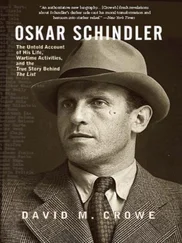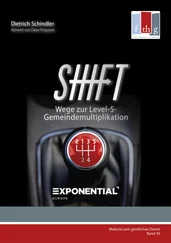The Gestapo men asked to see them, and Oskar took them through to the apartment. He made formal and cold introductions between Frau Schindler and the men from Bureau V. Then he brought out the suitcases and opened them. They were full of Amon’s civilian clothing, and old uniforms from the days when Amon had been a slim SS NCO. When they’d been through them and found nothing, they made the arrest.
Emilie grew aggressive now. They had no right, she said, to take her husband unless they could say what they were taking him for. The people in Berlin will not be happy about this, she said. Oskar advised her to be silent. But you will have to call my friend Klonowska, he told her, and cancel my appointments.
Emilie knew what that meant. Klonowska would do her trick with the telephone again, calling Martin Plathe in Breslau, the General Schindler people, all the big guns. One of the Bureau V men took out handcuffs and put them on Oskar’s wrists. They took him to their car, drove him to the station in Zwittau, and escorted him by train to Cracow.
The impression is that this arrest scared him more than the previous two. There are no stories of lovelorn SS colonels who shared a cell with him and drank his vodka. Oskar did later record some details, however. As the Bureau V men escorted him across the grand neoclassic loggia of the Cracow central station, a man named Huth approached them. He had been a civilian engineer in Płaszów. He had always been obsequious to Amon, but had a reputation for many secret kindnesses. It may have been an accidental meeting, but suggests that Huth may have been working with Klonowska. Huth insisted on shaking Oskar by his shackled hand. One of the Bureau V men objected. “Do you really want to go around shaking hands with prisoners?” he asked Huth. The engineer at once made a speech, a testimonial to Oskar. This was the Herr Direktor Schindler, a man greatly respected throughout Cracow, an important industrialist. “I can never think of him as a prisoner,” said Huth.
Whatever the significance of this meeting, Oskar was put into a car and taken across the familiar city to Pomorska Street again. They put him in a room like the one he had occupied during his first arrest, a room with a bed and a chair and a washbasin but with bars on the window. He was not easy there, even though his manner was one of bearlike tranquillity. In 1942, when they had arrested him the day after his thirty-fourth birthday, the rumor that there were torture chambers in the Pomorska cellars had been terrifying and indefinite. It wasn’t indefinite anymore.
He knew that Bureau V would torture him if they wanted Amon badly enough.
That evening Herr Huth came as a visitor, bringing with him a dinner tray and a bottle of wine. Huth had spoken to Klonowska. Oskar himself would never clarify whether or not Klonowska had prearranged that “chance encounter.” Whichever it was, Huth told him now that Klonowska was rallying his old friends.
The next day he was interrogated by a panel of twelve SS investigators, one a judge of the SS Court. Oskar denied that he had given any money to ensure that the Commandant would, in the words of the transcript of Amon’s evidence, “go easy on the Jews.” I may have given him the money as a loan, Oskar admitted at one stage. Why would you give him a loan? they wanted to know. I run an essential war industry, said Oskar, playing the old tune. I have a body of skilled labor. If it is disturbed, there is loss to me, to the Armaments Inspectorate, to the war effort. If I found that in the mass of prisoners in Płaszów there was a skilled metalworker of a category I needed, then of course I asked the Herr Commandant for him. I wanted him fast, I wanted him without red tape. My interest was production, its value to me, to the Armaments Inspectorate. In consideration of the Herr Commandant’s help in these matters, I may have given him a loan.
This defense involved some disloyalty to his old host, Amon. But Oskar would not have hesitated. His eyes gleaming with transparent frankness, his tone low, his emphasis discreet, Oskar—without saying it in so many words—let the investigators know that the money had been extorted. It didn’t impress them. They locked him away again.
The interrogation went into a second, third, and fourth day. No one did him harm, but they were steely. At last he had to deny any friendship with Amon at all. It was no great task: he loathed the man profoundly anyhow. “I’m not a fairy,” he growled at the gentlemen of Bureau V, falling back on rumors he’d heard about Goeth and his young orderlies.
Amon himself would never understand that Oskar despised him and was willing to help the case Bureau V had against him. Amon was always deluded about friendship. In sentimental moods, he believed that Mietek Pemper and Helen Hirsch were loving servants. The investigators probably would not have let him know that Oskar was in Pomorska and would have listened mutely to Amon urging them, “Call in my old friend Schindler. He’ll vouch for me.”
What helped Oskar most when he faced the investigators was that he had had few actual business connections with the man. Though he had sometimes given Amon advice or contacts, he had never had a share in any deal, never made a złoty out of Amon’s sales of prison rations, of rings from the jewelry shop, of garments from the custom-tailoring plant or furniture from the upholstery section. It must also have helped him that his lies were disarming even to policemen, and that when he told the truth he was positively seductive. He never gave the impression that he was grateful for being believed. For example, when the gentlemen of Bureau V looked as if they might at least give standing room to the idea that the 80,000 RM. was a “loan,” a sum extorted, Oskar asked them whether in the end the money might be returned to him, to Herr Direktor Schindler, the impeccable industrialist.
A third factor in Oskar’s favor was that his credentials checked out. Colonel Erich Lange, when telephoned by Bureau V, stressed Schindler’s importance to the conduct of the war. Sussmuth, called in Troppau, said that Oskar’s plant was involved in the production of “secret weapons.” It was not, as we will see, an untrue statement. But when said bluntly, it was misleading and carried a distorted weight. For the Führer had promised “secret weapons.” The phrase itself was charismatic and extended its protection now to Oskar. Against a phrase like “secret weapons,” any confetti of protest from the burghers of Zwittau did not count.
But even to Oskar it did not seem that the imprisonment was going well. About the fourth day, one of his interrogators visited him not to question him but to spit at him. The spittle streaked the left lapel of his suit. The man ranted at him, calling him a Jew-lover, a fucker of Jewesses. It was a departure from the strange legalism of the interrogations. But Oskar wasn’t sure that it was not planned, that it did not represent the true impetus behind his imprisonment.
After a week, Oskar sent a message, by way of Huth and Klonowska, to Oberführer Scherner. Bureau V was putting such pressure on him, the message went, that he did not believe he could protect the former police chief much longer. Scherner left his counterinsurgency work (it was soon to kill him) and arrived in Oskar’s cell within a day. It was a scandal what they were doing, said Scherner. What about Amon? Oskar asked, expecting Scherner to say that that was a scandal too. He deserves all he gets, said Scherner. It seemed that everyone was deserting Amon. Don’t worry, said Scherner before leaving, we intend to get you out.
On the morning of the eighth day, they let Oskar out onto the street. Oskar did not delay his going—nor did he, this time, demand transport. Enough to be deposited on the cold sidewalk.
Читать дальше












